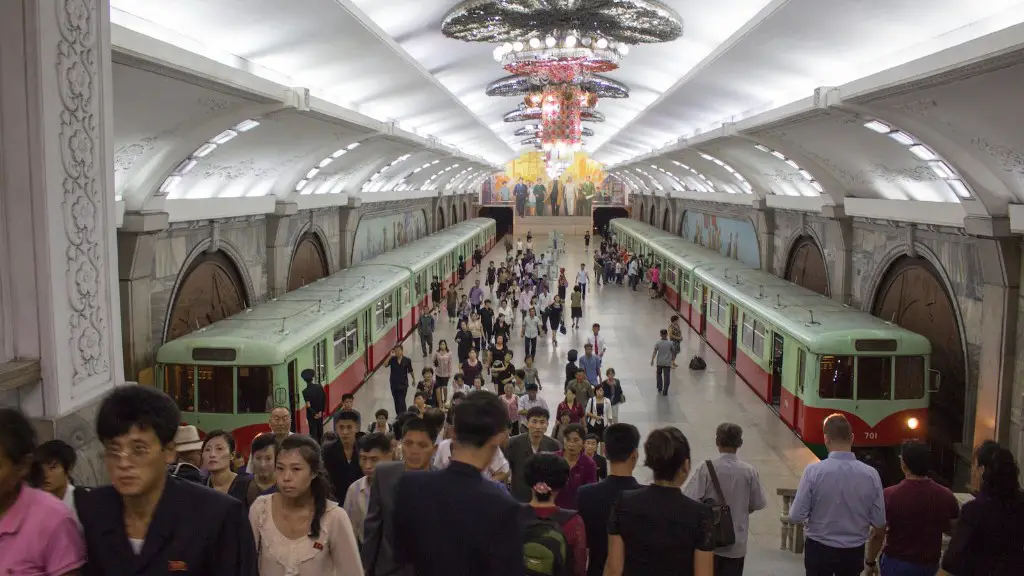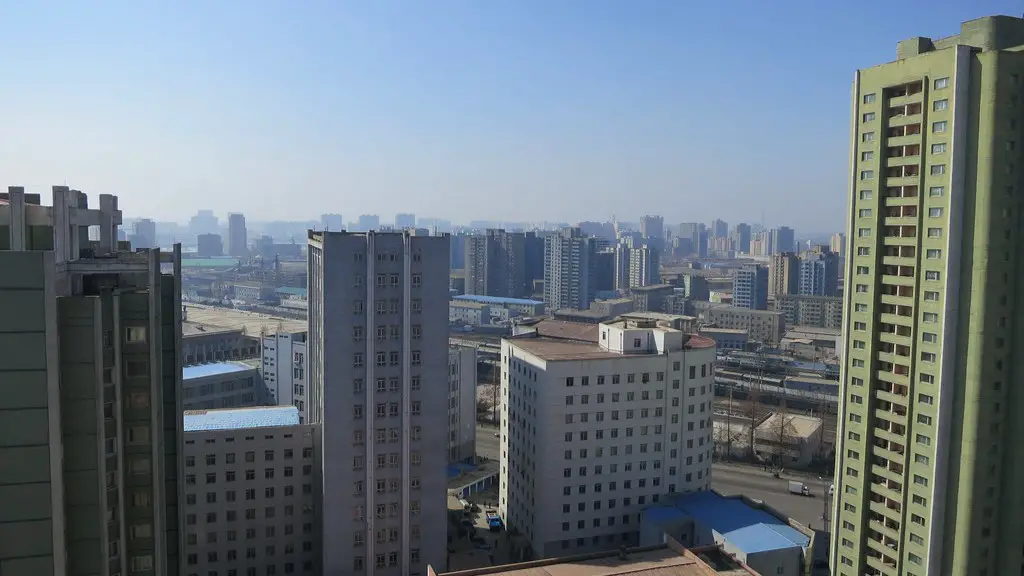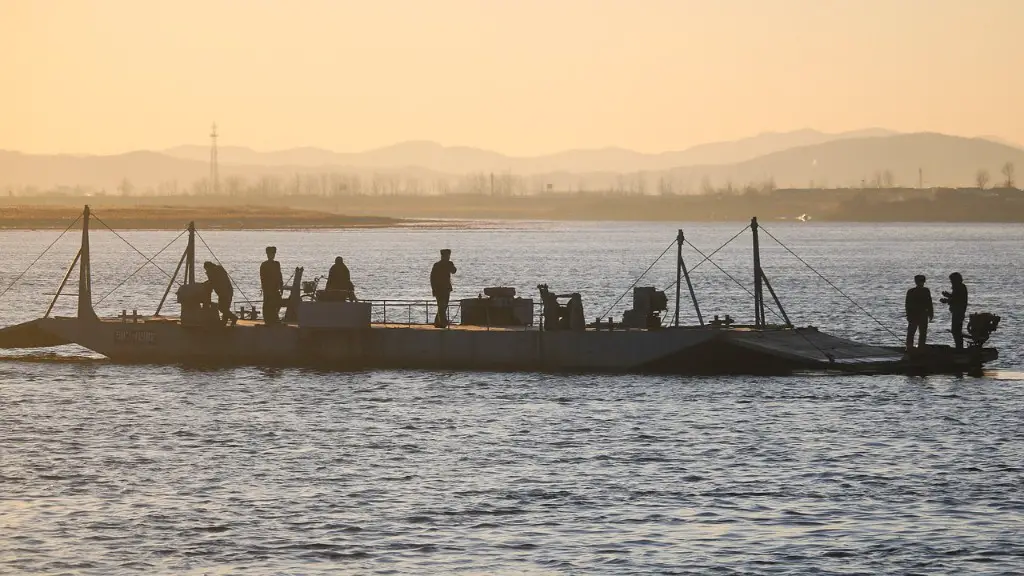The Squalor and Starvation of North Korea’s Lower Classes
North Korea has some of the harshest laws and regulations, especially with regards to its lower classes. Behind the media images broadcasted around the world of Kim Il-sung’s grand statues, military parades and festive mass dance rituals, a huge population of North Koreans are living in squalid squalor and whispers of starvation.
It is known that Kim Jong Un has a strict dictatorship and is not afraid to resort to violence, oppression, and extreme repression in order to remain in control. This repression severely restricts the movement of its citizens and is the reason why North Korea’s middle and lower classes lack basic freedoms, suffer poverty, malnutrition and an overall lack of educational opportunities.
Erik Svans, a political analyst, states that the North Korean government’s primary concern is ensuring that citizens have enough to eat and do not challenge their leadership. As a result, the country’s infrastructure remains underdeveloped and there is no access to foreign aid, leaving citizens to barely survive on what little resources are available.
It is estimated that more than 60 percent of its citizens are employed in agricultural labor, but with state-owned farms, lack of modern farming technology, and so-called war veterans occupying most of the land, there is no real opportunity for farmers to work the land and grow food. With the majority of it concentrated with those at the top, the people in the lower brackets suffer from a lack of nutrition and often produce only poor-tasting gruel made from potato peelings, wild herbs and cornmeal.
Relentless Western Sanctions
Western sanctions are among the most significant contributing factors to this poverty and starvation. The United States and Europe have imposed a range of sanctions on the Kim Jong Un’s regime, including a ban on luxury goods imports, restrictions on banking transactions and sanctions on North Korean government entities.
These sanctions have been reinforced throughout the years, even after Kim Jong Un has continued to threaten military action and ignored the United Nations Security Council’s demands for disarmament. With these restrictions, access to international markets, banking services and investments have been greatly limited, severely hindering North Korea’s economic development.
Government restrictions have also made it incredibly difficult for private businesses to operate and individuals to purchase goods, leaving many of the most deprived North Koreans to scavenge for scraps of material from the land in the hopes of earning a few pennies that can sustain their families.
The Scary Reality of Life inside North Korea’s Prisons
It is not just the lack of food and resources that residents of North Korea must endure. Political activists, prisoners of conscience, and, in many cases, innocent citizens, are all subjected to a plethora of horrendous acts of torture, violence and dehumanisation in the North Korean prison system.
The victims are often held in solitary confinement and interrogated in a series of loathsome cells, considered to be some of the worst prison systems in the world. It has been reported that inmates have been waterboarded, treated with electric shocks, and subjected to forced labor and dehydration, torture techniques which have been compared to those of World War II Nazi concentration camps.
Leen, a North Korean defector who was a former guard in one of these camps, has reported that prisoners were locked up all day, given only tiny amounts of food to eat and worked on the street cleaning and farmland all day, never receiving any payment. This daily torture resulted in countless prisoners dying from malnutrition, illness, or violence.
The Dread of Food Shortages and Mass Starvation
This lack of basic human rights, combined with the government’s reluctance to provide help and sanctions, has created a scenario of perpetual deprivation and brutal suppression of citizens.
The current food shortage in North Korea is the worst the region has seen in decades. Reports suggest that more than 10 million people are in danger of starvation and in desperate need of food aid. Added to this, there have been numerous reports of malnutrition, with many children and adults lacking access to basic necessities such as energy, vitamins, minerals and fiber for a healthy diet.
Nicole Meyer, an expert on nutrition, claims that the greatest threat to the country’s citizens are the ongoing food shortages. She states that from what is known, the population is enduring both physiological and psychological suffering from malnutrition. With reports that almost a quarter of North Korean children suffer from stunted growth, the hunger crisis of North Korea is one of the most severe in the world today.
A Growing Watched Population in the Digital Age
With the advancement of technology, North Korea has changed its tactics to remain in control of its citizens. Recent reports of the country’s tightening of internet access and mass surveillance of its citizens indicate that the government is determined to prevent people from accessing information it deems ‘dangerous’.
The North Korean police has been known to carry out internet searches of individuals, while the recent introduction of ‘red tags’ to identify people from certain target groups, such as those who publicly expressed dissent or try to escape, indicates that citizens must constantly be aware of the state’s presence.
In addition to this, the government has employed the use of sophisticated tracking technologies, such as facial recognition and biometric identification, to ensure that its citizens are teaming up with the police state ideology. With the government’s determination to prevent further western influence from gaining a foothold within the country, it has consistently tried to keep a hard line on the internal flow of information and ideas.
The Tragedy of North Korea’s Supreme Leader
The North Korean government’s need to maintain total control of its citizens has been taken to extreme levels. Kim Jong Un has been known to conduct public purges of anyone who is deemed to be a threat to his regime. Under his leadership, thousands of political prisoners have been executed, incarcerated and tortured; teachers and students have been subjected to arbitrary arrests and torture; whole families have been subject to brutal beatings and executed; and people found using foreign media have been sent to brutal camps.
Moreover, former North Korean journalists have revealed that there have been reports of the government forcing its citizens to have abortions if their pregnancies would result in birthing a ‘defective’ baby. This illustrates the stark reality of life in North Korea for its citizens and the tragedy of the country’s supreme leader.
A People with Dreams of Life Beyond North Korea
North Korea’s suffering is not unique, as citizens from other oppressive regimes also face poverty, food shortages, and extreme repression on a daily basis. Nevertheless, there is hope in the younger generation’s dreams for change.
Young North Koreans are increasingly finding ways to access outside information and ideas. They are using their smartphones, attending underground schools and learning about other cultures, history and religions, providing hope that a generation of North Koreans will be equipped and ready to face a future where they can demand greater freedoms and equal opportunities.
The new generation of North Koreans are also using social media to communicate with the outside world and encouraging dissidents to stand up and speak out. This can give North Koreans a platform to cement global public opinion on their government and significantly bring attention to their plight.
Seeking Refuge in South Korea
The most extreme consequence that North Korean citizens experience is the harsh punishment for defectors that escape the country’s borders. They are subject to torture, imprisonment, and potentially execution.
Nevertheless, in the recent years, there has been a shift in the number of escapee’s due to the dire conditions within North Korea’s prisons and the ever present threat of hunger and starvation. Many risk their lives and those of their families to seek refuge in South Korea and other neighboring countries.
South Korea, among other countries, has opened doors to these desperate souls and offered political asylum, medical and psychological aid, language education, and other social welfare services for refugees. They are also helping spread awareness about the situation in North Korea and finding ways to help citizens living there know what their rights are and how to stand up for them.
Oppressive Laws on Religion and Freedom of Speech
The dire situation within North Korea has been further exacerbated by oppressive laws on religion and freedom of speech, which makes it difficult for citizens to express their opinions about the government and ensure their fundamental rights.
Faith based activities are strictly prohibited and those caught participating, preaching, or practicing are subject to arrest and detention. It is also difficult for outside NGOs to monitor and report human rights violations, as the government forces all charitable foundations to register with a state organization, severely limiting the amount of information they can access and who they can help.
The North Korean regime is also known to spread false information through state controlled outlets, manipulating them to serve its own interests. This deceit tarnishes the truth and prevents people from discovering the reality of the country.
The Final Step Towards Denying It All
Recently, North Korea has taken a more severe stance towards its citizens regarding access to information and the ongoing famine, with evidence of increased censorship, surveillance and prison time for those who speak out.
The state has tightened its control on cell phones to ensure its citizens are restricted from communicating with the outside world by blocking all access to foreign media. It is also known to be hiding and denying reports about the famine to conceal its lack of progress in resolving the issue.
This paints an even more tragic picture of the harsh reality of life in North Korea, the damaging effects that have been caused by the relentless sanctions imposed on the region, and the oppressive laws and regulations on freedom of speech and religion.
It is clear that North Korea doesn’t want its citizens or the world to know the truth behind its desperate situation and the many horrid human rights violations that continue to go by unseen and unchecked.


